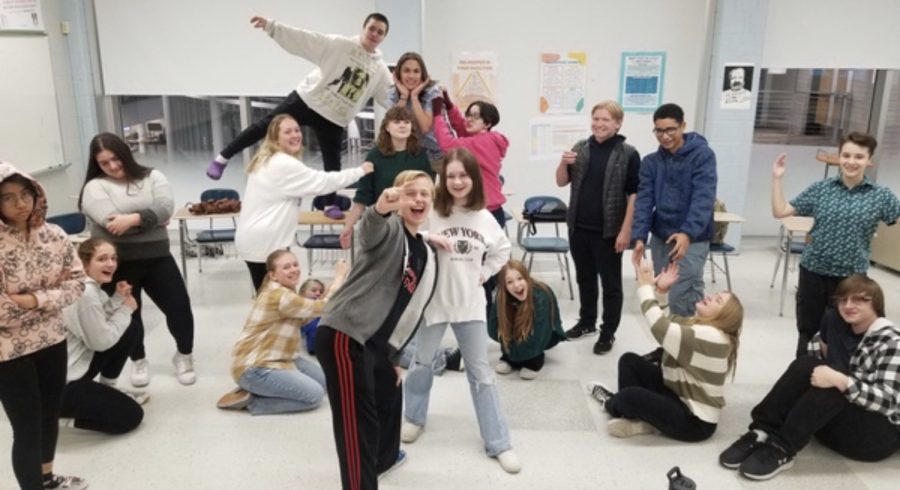Student actors and teachers express tips to aspiring beginner actors
A Christmas Carol: Scrooge and Marley cast participating in an improv activity to improve acting skills and further develop in the play.
There are many tips and tricks that make a successful actor. Students and teachers share experiences that they have been influenced by and that have helped them learn what it means to be a successful actor.
Two recent plays performed at DGS’s very own theater were “Small Mouth Sounds” and “A Christmas Carol: Scrooge and Marley.”
Junior Vint Harris, a member of the “Small Mouth Sounds” cast, expressed some acting tips for beginner student actors to take on.
“It’s important in day-to-day life to acknowledge how you react and how others react to certain emotions. Mostly depending on the play, it’s very important on what character you are playing and how you enter. The better you know the character, the better you know yourself and how people will react, and the better your acting will be,” Harris said.
Harris shares his experiences of being on stage with the fall play, “Small Mouth Sounds.”
“What matters about the plays is that you spend so much time on it and after a while, you think to yourself, what am I doing this for? Then when you are out there doing the show and see the crowd express their reactions and how much they like it, it’s so worth it,” Harris said.
Junior Will Elliot agrees with the importance of reflecting on performances.
After Elliot’s experience in the winter play, “A Christmas Carol: Scrooge and Marley,” he suggests that beginner student actors practice more audition materials.
“My biggest advice is to practice looking at the audition material more than three times before you walk into the audition room. This helps you become a lot more comfortable and confident. Second, be yourself. The directors are trying to see what characters will fit you the most. They are looking for personality and talent,” Elliot said.
Elliot also suggests modeling one’s acting based on successful actors.
“Find an actor which you like and analyze their acting. For example, when I was younger I wanted to be like Conan O’Brien, so I watched his stuff a ton and now I understand his formula,” Elliot said.
Elliot finds that one of the most important programs at DGS to help with acting is Speech.
“Speech is an after-school activity where you can choose to do a ton of work with directors to help teach you new skills, how to read scripts, and how to perform in front of an audience. Speech has helped me a lot with my acting, and I 100 percent recommend our nationally-recognized speech program,” Elliot said.
Play director and English teacher Tiffany Rubin expresses what the auditions are like from a director’s perspective.
“I can’t say ‘don’t be nervous,’ because that is something that happens naturally, even for seasoned actors. What I would say is that it is a laidback process for our school, even for the fall and winter plays and it’s just the two of us in the room, and nobody else is watching you. You don’t have to have any experience,” Rubin said.
When it comes to auditioning there are many ways that one could audition for a desired role and Rubin believes that the auditions that stand out are the ones that are most successful.
“We’re looking for something interesting or different that we can work with for the initial audition and if you get called back, then you get a script to see a little more with what we could do,” Rubin said.
Play director and English teacher Nathaniel Haywood suggests not overthinking the process when it comes to auditioning.
“If you are at all interested, then go for it! The audition process is actually much less intimidating than it seems, and we love to get new students involved. The number one comment I hear from new students involved in drama is ‘I wish I had done this earlier,’ so I encourage everyone to do it as soon as they are able,” Haywood said.


Daniel Crane • Jan 23, 2023 at 6:41 am
Outstanding article, well articulated and to the point.. go for it and grow yourself and your skills while having fun. Well done!
Larry Crane • Jan 16, 2023 at 1:08 pm
Hi Mitchell– I think this article is excellent. It’s informative for readers who have no desire to act or be in a play, and it’s inspirational for readers who have perhaps considered auditioning for a play but haven’t done so yet. You’ve done a nice job of interviewing people and organizing their thoughts in an interesting way.
Grandpa